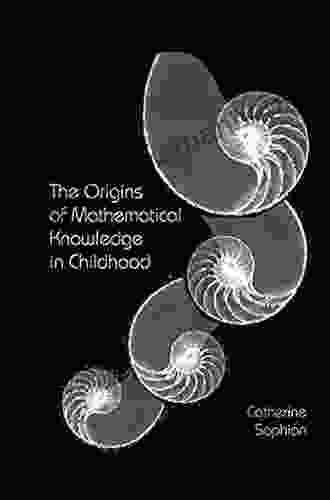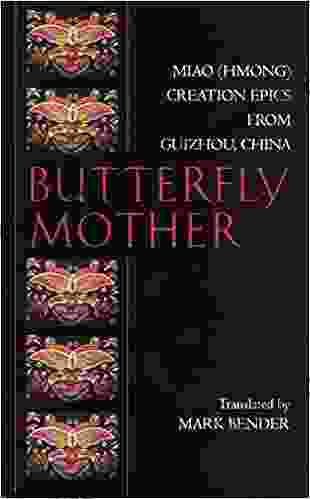The Origins of Mathematical Knowledge in Childhood: Studies in Mathematical Education

Mathematical knowledge is a fundamental aspect of human cognition, enabling us to understand and interact with the world around us. But where does this knowledge come from? How do we develop our understanding of numbers, shapes, and patterns? Studies in mathematical education have shed light on the origins of mathematical knowledge in childhood, providing insights into the role of play, social interactions, and cultural factors in the development of mathematical thinking and understanding.
5 out of 5
| Language | : | English |
| File size | : | 1050 KB |
| Text-to-Speech | : | Enabled |
| Screen Reader | : | Supported |
| Enhanced typesetting | : | Enabled |
| Word Wise | : | Enabled |
| Print length | : | 218 pages |
The Role of Play in Mathematical Learning
Play is a natural and essential part of childhood, and it plays a vital role in the development of mathematical knowledge. Through play, children explore their environment, experiment with different materials, and engage in imaginative activities that foster their understanding of mathematical concepts. For example, playing with blocks helps children develop their spatial reasoning skills, while playing board games can teach them about strategy and probability.
One of the most important aspects of play for mathematical learning is its social nature. When children play together, they share ideas, collaborate on projects, and learn from each other. This social interaction helps children to develop their communication skills, their ability to reason logically, and their understanding of mathematical concepts. For example, a study by researchers at the University of California, Berkeley found that children who played a cooperative math game with a peer outperformed children who played the game alone. The researchers concluded that the social interaction in the game helped the children to develop their mathematical reasoning skills.
The Role of Social Interactions in Mathematical Learning
In addition to play, social interactions play a crucial role in the development of mathematical knowledge in childhood. Children learn from their parents, siblings, teachers, and peers, and these interactions help them to develop their understanding of mathematical concepts. For example, a study by researchers at the University of Michigan found that children who had mothers who were more involved in their mathematical learning had higher math scores. The researchers concluded that the mothers' involvement helped the children to develop their math skills by providing them with opportunities to practice and learn.
Social interactions also help children to develop their mathematical language. When children talk about math with others, they learn how to use mathematical terms and concepts correctly. This helps them to develop their understanding of mathematics and to communicate their mathematical ideas more effectively. For example, a study by researchers at the University of Cambridge found that children who had more conversations about math with their parents had higher math scores. The researchers concluded that the conversations helped the children to develop their mathematical language and understanding.
The Role of Cultural Factors in Mathematical Learning
Cultural factors also play a role in the development of mathematical knowledge in childhood. The culture in which a child lives influences the child's experiences with mathematics, which in turn can affect the child's mathematical development. For example, a study by researchers at the University of California, Los Angeles found that children from cultures that emphasize memorization and rote learning had higher math scores than children from cultures that emphasize understanding and problem-solving. The researchers concluded that the cultural emphasis on memorization and rote learning helped the children to develop their math skills.
However, it is important to note that cultural factors can also have a negative impact on the development of mathematical knowledge in childhood. For example, a study by researchers at the University of Oxford found that children from cultures that emphasize gender stereotypes had lower math scores than children from cultures that do not emphasize gender stereotypes. The researchers concluded that the gender stereotypes discouraged girls from pursuing math and science careers.
The origins of mathematical knowledge in childhood are complex and multifaceted, influenced by a range of factors including play, social interactions, and cultural factors. By understanding these factors, we can better support the development of mathematical knowledge in children and help them to reach their full potential in math and science.
5 out of 5
| Language | : | English |
| File size | : | 1050 KB |
| Text-to-Speech | : | Enabled |
| Screen Reader | : | Supported |
| Enhanced typesetting | : | Enabled |
| Word Wise | : | Enabled |
| Print length | : | 218 pages |
Do you want to contribute by writing guest posts on this blog?
Please contact us and send us a resume of previous articles that you have written.
 Top Book
Top Book Novel
Novel Fiction
Fiction Nonfiction
Nonfiction Literature
Literature Paperback
Paperback Hardcover
Hardcover E-book
E-book Audiobook
Audiobook Bestseller
Bestseller Classic
Classic Mystery
Mystery Thriller
Thriller Romance
Romance Fantasy
Fantasy Science Fiction
Science Fiction Biography
Biography Memoir
Memoir Autobiography
Autobiography Poetry
Poetry Drama
Drama Historical Fiction
Historical Fiction Self-help
Self-help Young Adult
Young Adult Childrens Books
Childrens Books Graphic Novel
Graphic Novel Anthology
Anthology Series
Series Encyclopedia
Encyclopedia Reference
Reference Guidebook
Guidebook Textbook
Textbook Workbook
Workbook Journal
Journal Diary
Diary Manuscript
Manuscript Folio
Folio Pulp Fiction
Pulp Fiction Short Stories
Short Stories Fairy Tales
Fairy Tales Fables
Fables Mythology
Mythology Philosophy
Philosophy Religion
Religion Spirituality
Spirituality Essays
Essays Critique
Critique Commentary
Commentary Glossary
Glossary Bibliography
Bibliography Index
Index Table of Contents
Table of Contents Preface
Preface Introduction
Introduction Foreword
Foreword Afterword
Afterword Appendices
Appendices Annotations
Annotations Footnotes
Footnotes Epilogue
Epilogue Prologue
Prologue Almaris Alonso Claudio
Almaris Alonso Claudio Ananyo Bhattacharya
Ananyo Bhattacharya Molly Maco
Molly Maco Jon Gertner
Jon Gertner Deidre Bevers
Deidre Bevers Allison Lawrence
Allison Lawrence Ennki Hakari
Ennki Hakari Tristan Sandler
Tristan Sandler David Graeber
David Graeber Jacob Riyeff
Jacob Riyeff David Crosby
David Crosby Mercedes Gonzalez
Mercedes Gonzalez Sofia Lundberg
Sofia Lundberg Tammi Morrison
Tammi Morrison J B Hagen
J B Hagen Calvert Crary
Calvert Crary Matty Dalrymple
Matty Dalrymple Joanne Chang
Joanne Chang Kenny Dill
Kenny Dill Simona Iacob
Simona Iacob
Light bulbAdvertise smarter! Our strategic ad space ensures maximum exposure. Reserve your spot today!

 Donovan CarterWhere Dreams Begin by Lianne Moriarty: A Captivating Journey into the Lives...
Donovan CarterWhere Dreams Begin by Lianne Moriarty: A Captivating Journey into the Lives...
 Henry JamesSkeleton Knight in Another World Light Novel Vol. 1: A Necromantic Adventure...
Henry JamesSkeleton Knight in Another World Light Novel Vol. 1: A Necromantic Adventure... Fernando BellFollow ·4.1k
Fernando BellFollow ·4.1k Curtis StewartFollow ·2.3k
Curtis StewartFollow ·2.3k Seth HayesFollow ·3.6k
Seth HayesFollow ·3.6k Isaiah PowellFollow ·8.7k
Isaiah PowellFollow ·8.7k Greg CoxFollow ·10.9k
Greg CoxFollow ·10.9k David BaldacciFollow ·8.6k
David BaldacciFollow ·8.6k Jean BlairFollow ·3.1k
Jean BlairFollow ·3.1k Aldous HuxleyFollow ·4.8k
Aldous HuxleyFollow ·4.8k

 Yukio Mishima
Yukio MishimaUnveiling the Zimmermann Telegram: A Pivotal Document in...
The Zimmermann Telegram, a diplomatic...

 George Martin
George MartinFearful Stories and Vile Pictures to Instruct Good Little...
In the annals of children's literature, few...

 Grant Hayes
Grant HayesJessica the Viscount Wallflower: A Tale of Transformation...
In the opulent ballrooms and glittering...

 Jerome Blair
Jerome BlairThe Economics of the Global Defence Industry: A...
The global...

 Blake Kennedy
Blake KennedyBreath of Heron - A Window into the Poetic Depths of...
In the realm of...
5 out of 5
| Language | : | English |
| File size | : | 1050 KB |
| Text-to-Speech | : | Enabled |
| Screen Reader | : | Supported |
| Enhanced typesetting | : | Enabled |
| Word Wise | : | Enabled |
| Print length | : | 218 pages |










